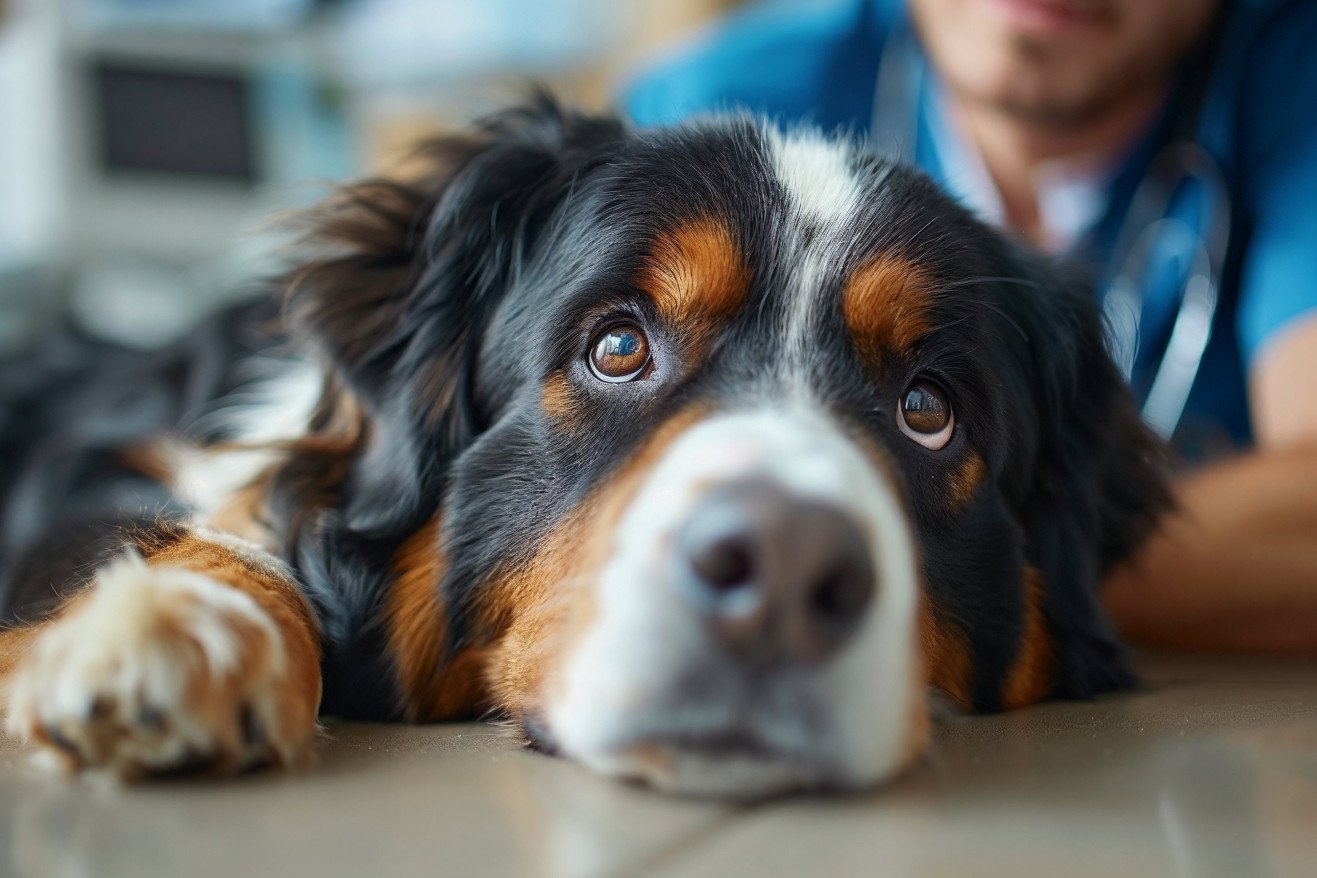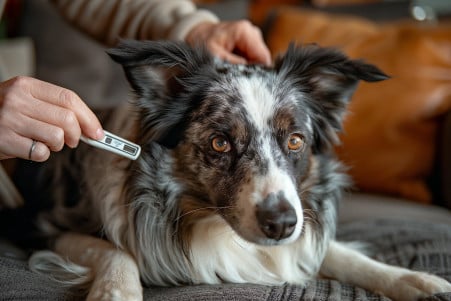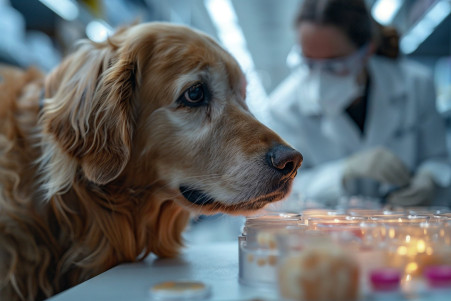Can Dogs Get Norovirus? Exploring Canine Viral Illnesses
20 March 2024 • Updated 19 March 2024

Can your dog get the dreaded norovirus that causes vicious bouts of vomiting and diarrhea in humans? No, dogs cannot get norovirus, which is a human-only virus. However, dogs can experience gastrointestinal issues that are similar to norovirus, but they are caused by other viruses that are specific to dogs or dietary issues that are not related to human norovirus strains.
To find out more about why dogs can get norovirus-like symptoms, we will look at scientific studies in the fields of veterinary medicine, virology, and animal health. This will help us understand the different viruses that affect dogs, how they are spread, how they can be prevented, and what makes them different from the human-specific norovirus. This information will help dog owners protect their pets.
Can dogs get norovirus?
Signs and Treatment of Viral Gastroenteritis in Dogs
Dogs that have viral gastroenteritis will typically show signs of vomiting, diarrhea, lethargy, dehydration, and a loss of appetite, according to PetMD. In more severe cases, such as acute hemorrhagic diarrhea syndrome (AHDS), it’s important to seek veterinary care immediately because VCA Animal Hospitals says that AHDS can be fatal if not treated right away.
The main goals of treatment are to control vomiting and diarrhea and to ensure that the dog is properly hydrated, which is often done through oral or intravenous fluids. In addition, antibiotics may be used to treat any bacterial infections, and anti-diarrheal medications may be used to help control the dog’s intestinal movements. In addition, a diet that is bland, low in fat, and easy to digest can help the dog recover, according to VCA Animal Hospitals.
With treatment that includes IV fluids, electrolyte support, and other supportive drugs, PetMD says that the survival rate for dogs with AHDS is between 90-95%. Although it can be scary, viral gastroenteritis in dogs can often be treated successfully with the help of a vet and lead to a full recovery.
Human Norovirus Infection in Dogs
More recently, studies have shown that human norovirus can bind to canine gastrointestinal tissue, indicating that zoonotic infection is possible. In one study published in the Journal of Clinical Microbiology, seven different genotypes of human norovirus virus-like particles were shown to bind to canine tissue, demonstrating that infection is possible.
Serological evidence also shows that dogs have been exposed to and mounted an immune response to human norovirus, suggesting that productive infection is possible. The study showed that 43 of 325 canine serum samples had evidence of exposure to human norovirus, and that canine seroprevalence paralleled that of the human population.
In addition, gastrointestinal illness outbreaks in households have affected both humans and dogs, and genetic analysis has shown that the dogs were infected with human norovirus, indicating that transmission between humans and dogs is possible.
Although the role of dogs in human norovirus outbreaks is not yet clear, these studies suggest that zoonotic transmission is possible and that more research is needed to determine the extent of the risk.
Potential for Zoonotic and Reverse Zoonotic Transmission
Although there is no direct evidence that dogs can transmit human norovirus through their feces, it is possible. A study published in the Journal of Clinical Microbiology found that human norovirus could attach to canine gastrointestinal tissues, indicating the potential for replication and shedding. In addition, some dogs have been shown to carry human norovirus after being in close contact with infected people, which suggests that dogs could be a source of the virus.
To minimize the risk of potential transmission, researchers advise that people practice good hygiene around their pets, especially when there is a case of gastroenteritis. The risk of transmission from dogs to humans is still not well understood and needs to be studied further, especially since a study reported in ScienceDaily found that there was no evidence that dogs were shedding human norovirus in amounts that would be enough to infect people.
How Common Is Canine Norovirus and What Are the Risk Factors?
Canine noroviruses have been found in dogs around the world, and they are more common in dogs with symptoms than in those without. For example, a study in the journal Emerging Infectious Diseases found that a new canine norovirus was present in 40% of dogs with diarrhea and 9% of dogs without diarrhea in Portugal.
Risk factors for canine norovirus infections are likely similar to those for human norovirus infections, which include living in close quarters such as shelters or kennels where the virus can spread easily, as the study suggests. Puppies and dogs with weakened immune systems are also more susceptible to norovirus infections and more likely to experience complications from them, according to WagWalking.
Even though canine noroviruses are different from the human version, it's still important to know how common they are and what the risk factors are so that dog owners can take the necessary steps to protect their pets. This includes making sure to practice good hygiene and take other preventive measures to reduce the likelihood of these viruses being transmitted to dogs.
Preventative Measures and Hygiene Precautions
To prevent the potential spread of norovirus between humans and dogs, it is recommended that good hygiene practices, like handwashing and cleaning pet living areas, be followed, according to MedicalNewsToday. People who are sick should avoid close contact with their pets, especially during episodes of vomiting or diarrhea, to keep the risk of exposure low. PetCareRx suggests using disinfectants to clean pet bedding, toys, and surfaces to help get rid of any virus that may be present.
If a dog does get a suspected norovirus infection, it should be taken to the vet for care, and it may need to be quarantined to prevent the virus from spreading, according to PetCareRx. Keeping a dog's vaccinations up to date and making sure they eat a healthy diet can also help keep their immune system strong and reduce the risk of viral infections. By following these guidelines, pet parents can protect their furry friends and reduce the risk of norovirus being transmitted between humans and dogs.
Conclusion: Understanding Canine Viral Illnesses
Although dogs can’t get human norovirus, they can get sick with similar gastrointestinal symptoms due to viruses that only affect canines.
Recent research has suggested that dogs may be susceptible to human norovirus and that the virus may be transmitted between humans and dogs, the risk to humans is still unknown.
However, it’s always important to practice good hygiene and to take sick pets to the vet. It’s also important to know the signs of human and canine viral illnesses.


